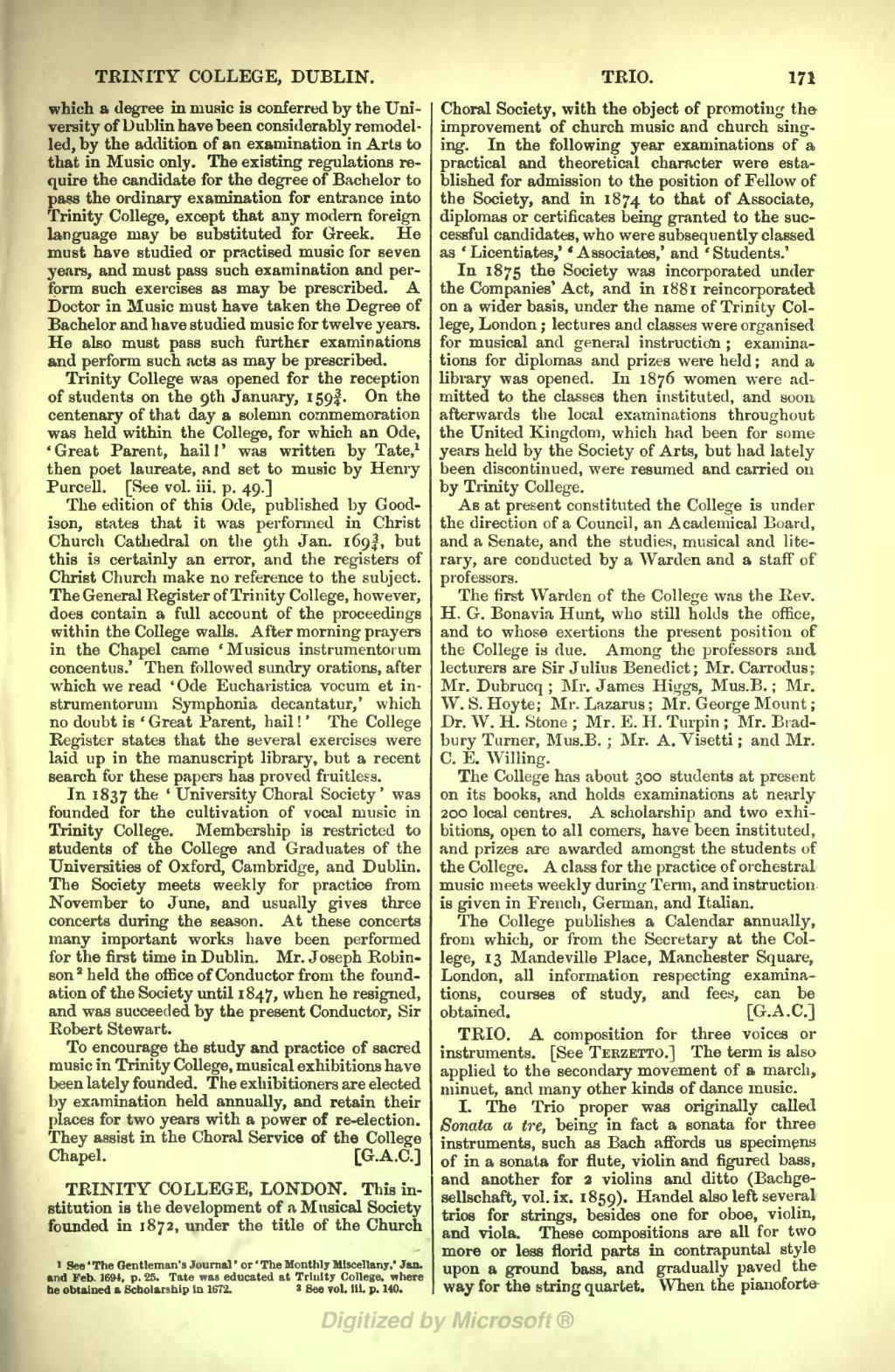which a degree in music is conferred by the University of Dublin have been considerably remodelled, by the addition of an examination in Arts to that in Music only. The existing regulations require the candidate for the degree of Bachelor to pass the ordinary examination for entrance into Trinity College, except that any modern foreign language may be substituted for Greek. He must have studied or practised music for seven years, and must pass such examination and perform such exercises as may be prescribed. A Doctor in Music must have taken the Degree of Bachelor and have studied music for twelve years. He also must pass such further examinations and perform such acts as may be prescribed.
Trinity College was opened for the reception of students on the 9th January, 159¾. On the centenary of that day a solemn commemoration was held within the College, for which an Ode, 'Great Parent, hail!' was written by Tate,[1] then poet laureate, and set to music by Henry Purcell. [See vol. iii. p. 49.]
The edition of this Ode, published by Goodison, states that it was performed in Christ Church Cathedral on the 9th Jan. 169¾, but this is certainly an error, and the registers of Christ Church make no reference to the subject. The General Register of Trinity College, however, does contain a full account of the proceedings within the College walls. After morning prayers in the Chapel came 'Musicus instrumentorum concentus.' Then followed sundry orations, after which we read 'Ode Eucharistica vocum et instrumentorum Symphonia decantatur,' which no doubt is 'Great Parent, hail!' The College Register states that the several exercises were laid up in the manuscript library, but a recent search for these papers has proved fruitless.
In 1837 the 'University Choral Society' was founded for the cultivation of vocal music in Trinity College. Membership is restricted to students of the College and Graduates of the Universities of Oxford, Cambridge, and Dublin. The Society meets weekly for practice from November to June, and usually gives three concerts during the season. At these concerts many important works have been performed for the first time in Dublin. Mr. Joseph Robinson[2] held the office of Conductor from the foundation of the Society until 1847, when he resigned, and was succeeded by the present Conductor, Sir Robert Stewart.
To encourage the study and practice of sacred music in Trinity College, musical exhibitions have been lately founded. The exhibitioners are elected by examination held annually, and retain their places for two years with a power of re-election. They assist in the Choral Service of the College Chapel.
[ G. A. C. ]
TRINITY COLLEGE, LONDON. This institution is the development of a Musical Society founded in 1872, under the title of the Church Choral Society, with the object of promoting the improvement of church music and church singing. In the following year examinations of a practical and theoretical character were established for admission to the position of Fellow of the Society, and in 1874 so that of Associate, diplomas or certificates being granted to the successful candidates, who were subsequently classed as 'Licentiates,' 'Associates,' and 'Students.'
In 1875 the Society was incorporated under the Companies' Act, and in 1881 reincorporated on a wider basis, under the name of Trinity College, London; lectures and classes were organised for musical and general instruction; examinations for diplomas and prizes were held; and a library was opened. In 1876 women were admitted to the classes then instituted, and soon afterwards the local examinations throughout the United Kingdom, which had been for some years held by the Society of Arts, but had lately been discontinued, were resumed and carried on by Trinity College.
As at present constituted the College is under the direction of a Council, an Academical Board, and a Senate, and the studies, musical and literary, are conducted by a Warden and a staff of professors.
The first Warden of the College was the Rev. H. G. Bonavia Hunt, who still holds the office, and to whose exertions the present position of the College is due. Among the professors and lecturers are Sir Julius Benedict; Mr. Carrodus; Mr. Dubrucq; Mr. James Higgs, Mus.B.; Mr. W. S. Hoyte; Mr. Lazarus; Mr. George Mount; Dr. W. H. Stone; Mr. E. H. Turpin; Mr. Bradbury Turner, Mus.B.; Mr. A. Visetti; and Mr. C. E. Willing.
The College has about 300 students at present on its books, and holds examinations at nearly 200 local centres. A scholarship and two exhibitions, open to all comers, have been instituted, and prizes are awarded amongst the students of the College. A class for the practice of orchestral music meets weekly during Term, and instruction, is given in French, German, and Italian.
The College publishes a Calendar annually, from which, or from the Secretary at the College, 13 Mandeville Place, Manchester Square, London, all information respecting examinations, courses of study, and fees, can be obtained.
[ G. A. C. ]
TRIO. A composition for three voices or instruments. [See Terzetto.] The term is also applied to the secondary movement of a march, minuet, and many other kinds of dance music.
I. The Trio proper was originally called Sonata a tre, being in fact a sonata for three instruments, such as Bach affords us specimens of in a sonata for flute, violin and figured bass, and another for 2 violins and ditto (Bachgesellschaft, vol. ix. 1859). Handel also left several trios for strings, besides one for oboe, violin, and viola. These compositions are all for two more or less florid parts in contrapuntal style upon a ground bass, and gradually paved the way for the string quartet. When the pianoforte
- ↑ See 'The Gentleman's Journal' or 'The Monthly Miscellany,' Jan. and Feb. 1694, p. 25. Tate was educated at Trinity College, where he obtained a Scholarship in 1672.
- ↑ See vol. iii. p. 140.
